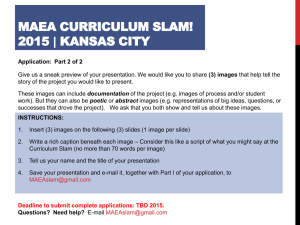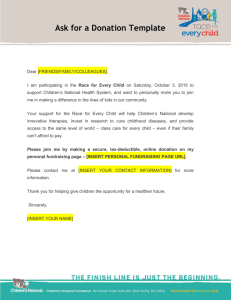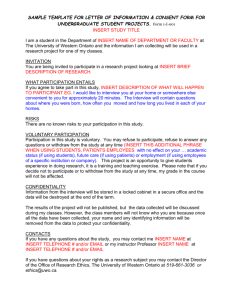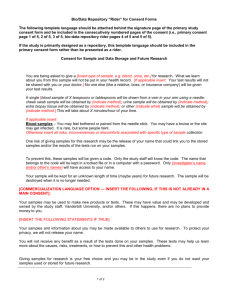Participant information statement
advertisement
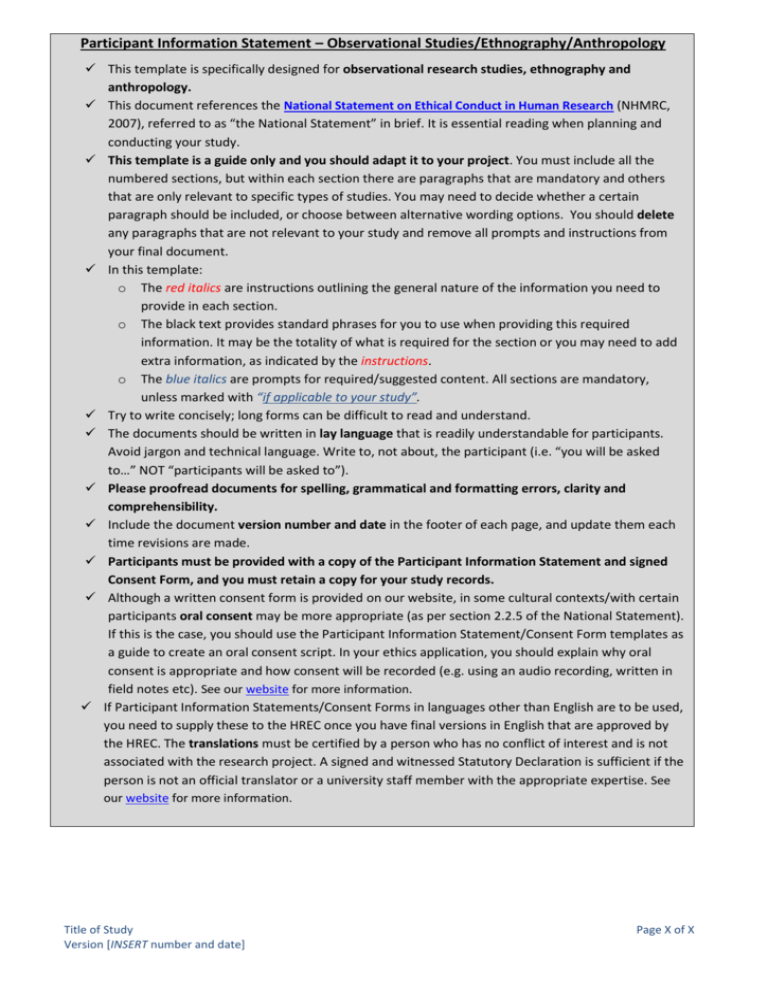
Participant Information Statement – Observational Studies/Ethnography/Anthropology This template is specifically designed for observational research studies, ethnography and anthropology. This document references the National Statement on Ethical Conduct in Human Research (NHMRC, 2007), referred to as “the National Statement” in brief. It is essential reading when planning and conducting your study. This template is a guide only and you should adapt it to your project. You must include all the numbered sections, but within each section there are paragraphs that are mandatory and others that are only relevant to specific types of studies. You may need to decide whether a certain paragraph should be included, or choose between alternative wording options. You should delete any paragraphs that are not relevant to your study and remove all prompts and instructions from your final document. In this template: o The red italics are instructions outlining the general nature of the information you need to provide in each section. o The black text provides standard phrases for you to use when providing this required information. It may be the totality of what is required for the section or you may need to add extra information, as indicated by the instructions. o The blue italics are prompts for required/suggested content. All sections are mandatory, unless marked with “if applicable to your study”. Try to write concisely; long forms can be difficult to read and understand. The documents should be written in lay language that is readily understandable for participants. Avoid jargon and technical language. Write to, not about, the participant (i.e. “you will be asked to…” NOT “participants will be asked to”). Please proofread documents for spelling, grammatical and formatting errors, clarity and comprehensibility. Include the document version number and date in the footer of each page, and update them each time revisions are made. Participants must be provided with a copy of the Participant Information Statement and signed Consent Form, and you must retain a copy for your study records. Although a written consent form is provided on our website, in some cultural contexts/with certain participants oral consent may be more appropriate (as per section 2.2.5 of the National Statement). If this is the case, you should use the Participant Information Statement/Consent Form templates as a guide to create an oral consent script. In your ethics application, you should explain why oral consent is appropriate and how consent will be recorded (e.g. using an audio recording, written in field notes etc). See our website for more information. If Participant Information Statements/Consent Forms in languages other than English are to be used, you need to supply these to the HREC once you have final versions in English that are approved by the HREC. The translations must be certified by a person who has no conflict of interest and is not associated with the research project. A signed and witnessed Statutory Declaration is sufficient if the person is not an official translator or a university staff member with the appropriate expertise. See our website for more information. Title of Study Version [INSERT number and date] Page X of X Discipline of Xxxxxxxxx School of Xxxxxxxxx Faculty of Xxxxxxxxx ABN 15 211 513 464 CHIEF INVESTIGATOR (SUPERVISOR) NAME Chief Investigator (Supervisor) Title [NB: this should not be a student researcher] Room XXX Building and code The University of Sydney NSW 2006 AUSTRALIA Telephone: +61 2 xxxx xxxx Facsimile: +61 2 xxxx xxxx Email: xxxxxxx@sydney.edu.au Web: http://www.sydney.edu.au/ [INSERT Title of Study] PARTICIPANT INFORMATION STATEMENT (1) What is this study about? You are invited to take part in a research study about [INSERT a brief description of the purpose, aims and significance of your study in lay language (i.e. in plain English).] You have been invited to participate in this study because [INSERT the reason for the invitation]. This Participant Information Statement tells you about the research study. Knowing what is involved will help you decide if you want to take part in the research. Please read this sheet carefully and ask questions about anything that you don’t understand or want to know more about. Participation in this research study is voluntary. By giving consent to take part in this study you are telling us that you: Understand what you have read. Agree to take part in the research study as outlined below. Agree to the use of your personal information as described. You will be given a copy of this Participant Information Statement to keep. (2) Who is running the study? The study is being carried out by the following researchers: [INSERT names, positions and organisational affiliations]. [INSERT, if applicable to your study – STUDENT DECLARATION] Title of Study Version [INSERT number and date] Page X of X [INSERT name of student] is conducting this study as the basis for the degree of [INSERT degree undertaken] at The University of Sydney. This will take place under the supervision of [INSERT name and position of supervisor]. [INSERT, if applicable to your study – FUNDING DECLARATION] This study is being funded by [INSERT name of funding body/bodies]. [INSERT, if applicable to your study, a description of any potential/actual CONFLICTS OF INTEREST for researchers and/or institutions involved in the project.] [INSERT, if applicable to your study, a description of any FINANCIAL BENEFITS to the researchers or institution that might arise from the conduct of the research. This description should include the nature of the potential financial benefits, which individuals/institutions are likely to receive these benefits, and a statement that participants will not personally receive any financial benefits as a result of these outcomes.] (3) What will the study involve for me? [Describe in lay terms what the study will involve from the participant’s perspective. The participant must be in a position to give fully informed consent. Remember to write to, not about, the participant (i.e. “you will be asked to…” not “participants will be asked to…”). You may wish to use tables, diagrams or flow charts to make the information more accessible and easily comprehensible. This includes information about the following, as applicable to your study. To the extent that this is known at the outset of the study, the nature, location, and timing of their involvement in study activities. This should include a description of what study activities will involve for the participant. For observational studies, there should be an explanation of the type of observation that will take place – where, by whom, across what time period, etc – and how the observations will be recorded. If any other activities will be involved (e.g. interviews), there should be a description of what those activities will involve (e.g. the types of questions they will be asked). Whether there will be any audio/video recording or photographs taken. Any access to their personal information or records that is being requested, including details of which information will be accessed, how it will be accessed, and for what purpose it will be used. This could include personal letters, photographs, journals etc. Whether an interpreter will be involved. A description of any opportunity for participants to review information generated about them prior to publication (e.g. review of interview transcripts or publications). This is likely to be appropriate where participants will be identifiable in publications. Be sure to describe the nature of the review process, when and how it will take place. See Section 3.1.15 of the National Statement for more guidance.] (4) How much of my time will the study take? [Describe how much time this study will involve for the participant, including both the time required for each part of the study and the total time commitment. Due to the nature of ethnographic and anthropological research, this may need to be a general estimate (e.g. “A Title of Study Version [INSERT number and date] Page X of X few hours per week across a period of around 6 months”) rather than a specific duration, but you should do your best to give participants an idea of the time commitment involved. If you have an idea of the specific time commitment involved in certain parts of the study (e.g. interviews), include that information as well.] (5) Do I have to be in the study? Can I withdraw from the study once I've started? Being in this study is completely voluntary and you do not have to take part. Your decision whether to participate will not affect your current or future relationship with the researchers or anyone else at the University of Sydney [INSERT, if applicable to your study, any other individuals or organisations related to your study]. If you decide to take part in the study and then change your mind later, you are free to withdraw at any time. You can do this by [INSERT a description of how to withdraw from the study]. [INSERT, if applicable to your study, a description of any consequences of withdrawing from the study]. [INSERT, if applicable to your study: INTERVIEWS]. You are free to stop the interview at any time. Unless you say that you want us to keep them, any recordings will be erased and the information you have provided will not be included in the study results. You may also refuse to answer any questions that you do not wish to answer during the interview. [INSERT, if applicable to your study: FOCUS GROUP] If you take part in a focus group, you are free to stop participating at any stage or to refuse to answer any of the questions. However, it will not be possible to withdraw your individual comments from our records once the group has started, as it is a group discussion. (6) Are there any risks or costs associated with being in the study? [Under the ethical principle of beneficence, research must be designed and carried out in such a way that the likely benefit justifies any risks of harm or discomfort (see the National Statement sections 1.6-1.9). Further, participants should be made aware of any risks involved in the project at the point of consent. Chapter 2.1 of the National Statement provides further guidance on risk and benefit in research. In this section you should use lay language to describe the nature, likelihood and severity of any risks to participants, as well as any measures that will be taken to manage these risks. Possible risks may include, but are not limited to: Psychological harms e.g. feelings of distress or anger. Devaluation of personal worth e.g. being humiliated. Social harms e.g. damage to social networks or relationships, discrimination in access to benefits, services, employment or insurance. Economic harms e.g. direct or indirect costs. Legal harms e.g. discovery and prosecution of criminal conduct if the researcher is obliged to disclose information relating to criminal activity by participants. Title of Study Version [INSERT number and date] Page X of X Discomfort e.g. mild negative feelings. Inconvenience e.g. giving up time to participate in the research project.] If no risks aside from inconvenience are anticipated, INSERT the following statement: Aside from giving up your time, we do not expect that there will be any risks or costs associated with taking part in this study. (7) Are there any benefits associated with being in the study? [If there is any direct financial or non-financial benefit to participants, describe the amount and nature. Financial benefits may include reimbursement/remuneration such as a voucher or money, whilst non-financial benefits include meals, refreshments, course credit, and small gifts. Remember to be realistic about the potential benefits, and to describe any conditions of receiving them (e.g. whether participants have to complete the whole study to receive the benefits, and what happens if they withdraw halfway through). Next describe any potential benefits to others in the future or to the broader community, being careful to distinguish these from any potential benefits to the participant themselves. Again, remember to be realistic and not over-state the potential benefits of the study.] If no direct benefits to participants are expected, INSERT the following statement: We cannot guarantee that you will receive any direct benefits from being in the study. (8) What will happen to information about me that is collected during the study? [This section needs to outline the following, in lay language: What types of information about participants will be recorded, collected and used in the study (including observations, transcripts/recordings of interviews or focus groups, collection of personal records etc). If there will be any recordings taken (e.g. video, audio, or photographs), an explanation of how these will be used (i.e. for analysis only, or also in publications). Details of any third parties who will have access to participants’ information during or after the study (e.g. transcription services). Whether personal information will be kept confidential, and any limits to confidentiality (e.g. mandatory reporting, court orders or subpoenas, for research that may uncover illegal activity). Whether (and how) participants may access their personal information from the study. How and where study results will be published (e.g. student theses, journal publications, conference presentations, other reports). Where electronic and hardcopy data will be stored during and after the study and who will have access to it. If cloud or network storage will be used, describe any associated privacy/data security/data ownership limitations. How long data will be retained after the study and what will happen at the end of the storage period. That is, will data be kept in perpetuity (indefinitely), destroyed or archived? If you intend to archive data, you should include the name of the archive(s). Title of Study Version [INSERT number and date] Page X of X Whether the data collected in this project is intended to be used for any other purpose (e.g. future research projects). This should also be declared in your ethics application.] By providing your consent, you are agreeing to us collecting personal information about you for the purposes of this research study. This information will only be used for the purposes outlined in this Participant Information Statement, unless you consent otherwise. [INSERT ONE OF THE FOLLOWING] [OPTION 1: where participants will NOT BE IDENTIFIABLE in publications]: Your information will be stored securely and your identity/information will be kept strictly confidential, except as required by law. Study findings may be published, but you will not be individually identifiable in these publications. [OPTION 2: where it is intended to protect participants’ identities but there is a RISK THEY WILL BE IDENTIFIABLE in publications e.g. studies that focus on a small and specific cohort]: Your information will be stored securely and your identity/information will be kept strictly confidential, except as required by law. Study findings may be published. Although every effort will be made to protect your identity, there is a risk that you might be identifiable in these publications due to the nature of the study and/or the results. [OPTION 3: where participants will be given the opportunity to CHOOSE WHETHER THEY ARE IDENTIFIED in publications]: Your information will be stored securely and your identity/information will only be disclosed with your permission, except as required by law. Study findings may be published, but you will not be identified in these publications unless you agree to this using the tick box on the consent form. [OPTION 4: where PARTICIPANTS WILL BE IDENTIFIED in publications e.g. oral history]: Your information will be stored securely and will only be disclosed with your permission, except as required by law. Study findings may be published, and you will be identified in these publications if you decide to participate in this study. [INSERT explanation of other points outlined above.] (9) Can I tell other people about the study? [INSERT one of the following]: OPTION 1: Where there is no reason for participants not to tell others about the study]: Yes, you are welcome to tell other people about the study. [OPTION 2: Where there is some reason for participants not to tell others about the study]: Please don’t talk to other people about the study, because [INSERT reason]. (10) What if I would like further information about the study? Title of Study Version [INSERT number and date] Page X of X When you have read this information, [INSERT name of appropriate investigator(s) who will be available at the time of consent] will be available to discuss it with you further and answer any questions you may have. If you would like to know more at any stage during the study, please feel free to contact [INSERT names, positions, university emails and phone numbers of at least one investigator. For overseas research, please include at least one local contact]. (11) Will I be told the results of the study? [Giving participants feedback about the overall study results (in a manner appropriate to a lay audience e.g. a one page lay summary) is standard practice, and is a key part of ensuring there is a fair distribution of the benefits of research participation. Feedback should be provided wherever possible. Of course, there may be some situations where this is not practicable. If this is the case, you should explain this in your ethics application and in the space below.] You have a right to receive feedback about the overall results of this study. You can tell us that you wish to receive feedback by [INSERT a description of how participants can indicate they are interested in receiving feedback e.g. ticking the relevant box on the consent form]. This feedback will be in the form of [INSERT a description of the feedback that participants will be provided with, ensuring it is appropriate for the audience e.g. a one page lay summary]. You will receive this feedback after the study is finished. (12) What if I have a complaint or any concerns about the study? Research involving humans in Australia is reviewed by an independent group of people called a Human Research Ethics Committee (HREC). The ethical aspects of this study have been approved by the HREC of the University of Sydney [INSERT protocol number once approval is obtained]. As part of this process, we have agreed to carry out the study according to the National Statement on Ethical Conduct in Human Research (2007). This statement has been developed to protect people who agree to take part in research studies. If you are concerned about the way this study is being conducted or you wish to make a complaint to someone independent from the study, please contact the university using the details outlined below. Please quote the study title and protocol number. The Manager, Ethics Administration, University of Sydney: Telephone: +61 2 8627 8176 Email: ro.humanethics@sydney.edu.au Fax: +61 2 8627 8177 (Facsimile) [INSERT, if applicable to your study, an independent local complaints contact for RESEARCH TAKING PLACE OVERSEAS/with participants who are located overseas – see section 4.8.16 of the National Statement. This should include their name, position and relevant contact details]. This information sheet is for you to keep Title of Study Version [INSERT number and date] Page X of X


